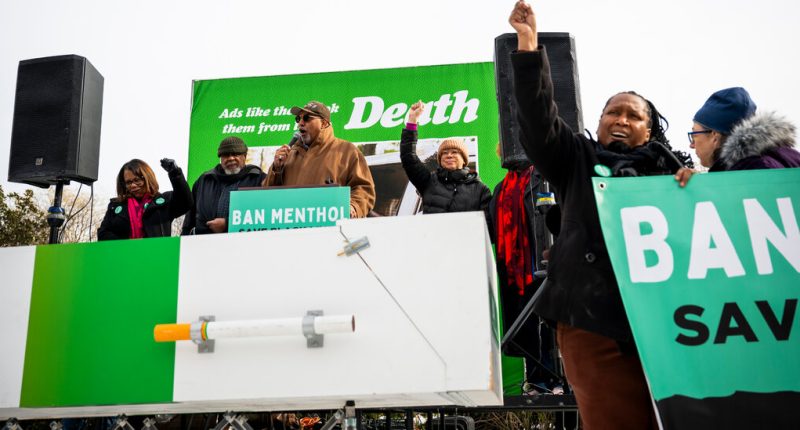Nearly a quarter of menthol cigarette smokers quit in the year or two after a ban on menthol went into effect, according to a study published on Wednesday.
Researchers found that about half of the menthol smokers switched to other cigarettes and another quarter managed to keep smoking menthols. The rate of menthol smokers who quit was higher in nations that imposed bans, in contrast with cities or states, since it was harder for people to drive a few miles to keep buying menthol cigarettes, according to the study.
In studies where smokers predicted changing behavior, about 12 percent said a ban would prompt them to switch to e-cigarettes or other nicotine alternatives.
The Food and Drug Administration has been urging the Biden administration to impose a ban on menthol cigarettes, a goal that has generated intense opposition from retailers and tobacco companies alongside concerns in a presidential election year that it could alienate Black voters.
Black smokers, who heavily favor menthol cigarettes, also stand to gain the most from such a ban, public health researchers say, noting that premature deaths from cancer, heart and lung disease could be avoided after a sharp decline in smoking rates.
The study analyzed the effects of bans in other countries, including Canada and some in the European Union, as well as bans in force in states, including Massachusetts. The researchers reviewed studies, smoking rates and cigarette sales as part of their analysis.
“Our review found that a menthol ban will have a pro-equity impact, meaning that we expect smoking to reduce the most among Black individuals who smoke as compared to other racial or ethnic groups,” said Sarah Mills, lead author of the study and an assistant professor at the University of North Carolina school of public health.
What remains to be seen is whether the White House, perhaps haunted by the anti-regulatory backlash against public-health measures taken during the coronavirus pandemic, will advance the ban this year. In December, the White House postponed a decision on the proposal until at least March, raising speculation that it would languish while President Biden seeks a second term.
Menthol cigarettes generate billions of dollars in sales each year for opponents of a ban, including Reynolds American, maker of Newport Cigarettes; Altria, maker of menthol Marlboros; and gas stations and convenience stores.
Opponents have mounted a campaign about possible fallout from a ban, sponsoring commercials that threaten a surge of illicit cigarette trafficking at the U.S.-Mexico border. They have also elevated the profile of those predicting a potential increase in police violence against Black menthol cigarette smokers. But the proposed U.S. ban does not target individuals; enforcement is proposed at the manufacturer’s level.
Public health experts have stepped up their pressure in recent weeks, staging a “menthol funeral” outside the White House to draw attention to the annual toll of 480,000 smoking-related deaths. Former surgeons general called on the White House earlier this month to “save lives” by immediately finalizing the ban and “not to be distracted by the tobacco industry and its apologists.”
And the Campaign for Tobacco-Free Kids released its own poll Thursday that suggested a ban would not diminish support of Black voters for the president. The survey, conducted for the advocacy group, indicated that 62 percent of respondents reported favoring a menthol ban, compared with 25 percent who disapproved.
“This new data proves what we already know to be true — Black voters want to see a menthol ban,” Derrick Johnson, president of the N.A.A.C.P., said in a statement.
In the new study, researchers noted that cigarette companies had raised concerns about illicit menthol trafficking as an argument against the ban. But the study indicated that Canada did not experience an increase in seizures of illicit cigarettes after its nationwide ban. It remains unclear whether a U.S. prohibition would have a similar effect.
In a study in 2021 that used a model to assess the effects of a menthol ban, David Levy, a Georgetown University oncology professor, found that it could lead to an overall reduction in smoking of about 15 percent. By 2060, the study projected, as many as 11 million years of life could be gained rather than lost to smoking-related deaths.
“These effects are delayed,” Dr. Levy said, “but nevertheless important.”
Ruth Igielnik contributed.
Also Read More: World News | Entertainment News | Celebrity News









